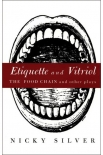Etiquette and Vitriol Nicky Silver (i can read book club txt) 📖

- Author: Nicky Silver
Book online «Etiquette and Vitriol Nicky Silver (i can read book club txt) 📖». Author Nicky Silver
When my sister died in my mother’s womb, my father buried his head in bottles and, I suspect, under the covers of strange beds.
(Returning) At any rate, after the third block of my walk, I started counting these people who committed what I considered were affronts against civilization. Have we learned nothing in the past five thousand years? Don’t these people, these spitters, realize that we all have to live together, and I would no sooner want to see their expectorations as I would their bowel movements? You may think me silly, but I believe that all the wars and suffering and prejudice and hate come down to nothing more than an unwillingness to understand each other. If we would only allow each other the space of our dignity, we would save so much time and trouble, and the money that we spend on nuclear weapons could be given to the New York City Ballet, who really do lovely work, that no one could find fault with!
As I was saying, I started counting “spitters.” And within the next three blocks, I counted thirteen more—well, actually I counted fourteen. But I allowed for one man who was also muttering to himself, and barking, from time to time, like a dog. I believe this man was suffering from, the once little-known, suddenly fashionable, disease called “Tourette’s syndrome.” I saw a story all about it on a television news magazine, and I was, therefore, in a position to be sympathetic. My aesthetic is not so rigid that it doesn’t allow for legitimate illness. I have never been sick a day in my life— but when I was eighteen, my father developed cancer of the pancreas and died. And he left me a great deal of money.
I don’t know why my mind keeps wandering back to my parents. It’s not what I intended, because something happened this morning, and I’m trying to get to that. But my mind keeps wandering off in tangents. A dear friend of mine once told me I spoke in a baroque fashion. I’ve no idea what she meant, but I’m sure it wasn’t a compliment. Oh well, I never liked her anyway!
Oh, I’ll get to my point, the thing that happened. I will. But right now I can’t help remembering my mother’s face at my father’s funeral. It was long. She had a long face. Like a Modigliani painting. I’ve never liked Modigliani, although I found the Off-Broadway play about him, several seasons back, mildly entertaining. Still, I thought Mother was lovely. She had more dimension than his paintings. And she moved. Slowly. She possessed the grace of a ballet dancer and the alacrity of a pachyderm—I’m using sarcasm to make a point. She was languid in an era when things considered beautiful actually were. Before minimalism creeped into our landscape, when we could see farther and were unhindered by the cataract of modernism. I seem to see her all the time as a ballet dancer, in a Degas painting. I’ve always liked Degas, and I feel badly that they never made a play about him. But Mother was lovely. And before “the baby,” as we euphemistically referred to her miscarriage, she was melancholy, but serene. Her hands were white, and she never wore nail polish. Every year at Christmas she would tie bows on handmade presents, her fingers dancing ’round the ribbons. And she worshipped my father, who was enormous. He had to be six and a half feet tall, with feet as big as tennis rackets. He scared me, truth be told. He would be very quiet, but inside there was an anger, building up, building over something, it could be anything. And then all of a sudden he would explode! And fists went flying and plates and tempers.—But he never swore. Which is odd. And makes him seem, somehow, less masculine, in my mind. But after “the baby,” things changed drastically.
Mother, whom I mentioned was laconic to begin with, became absolutely inert. I don’t mean the days immediately following, which, of course, she spent in bed. But the days became weeks and she wouldn’t budge. She never got out of bed of her own accord. After about three weeks, we, my father and I, foisted her into a sitting position and put a book in her lap. We tilted her head so she was in a position to read. But she didn’t! I sat there and stared and stared, and her eyes never touched a word! I said to her, “Mother, why don’t you read?” . . . . . . . . “I do not care to,” she responded. Resolutely.
Oh. Well. If she didn’t care to, she didn’t care to. There was little arguing. So at day’s end, we put the book on her nightstand and turned out her lamp. In the morning, we tried again. “Why don’t you read, Mother? You might enjoy it.” “I do not care to.” Hmmm. After about a week of “the book game,” I went with my father into her room. We tried to interest her in getting up, getting dressed. “I do not care to.” This was a woman of definite likes and dislikes. But my father had decided this “bed-rest thing” had gone on long enough. Perhaps, being a woman himself and only recently having had an unborn baby die in his belly, he felt he was the best judge.—I’m using sarcasm to make a point. So, we lifted her out of bed. This was easy. He was big. She was small. And he held





Comments (0)